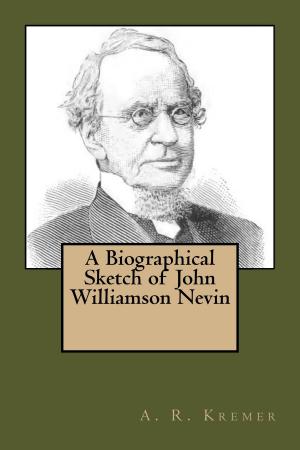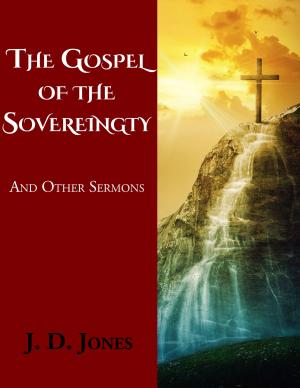Christianity Not Founded on Argument
The True Principle of Gospel Evidence
Nonfiction, Religion & Spirituality, Christianity, Christian Literature| Author: | Henry Dodwell | ISBN: | 1230001950748 |
| Publisher: | CrossReach Publications | Publication: | October 3, 2017 |
| Imprint: | Language: | English |
| Author: | Henry Dodwell |
| ISBN: | 1230001950748 |
| Publisher: | CrossReach Publications |
| Publication: | October 3, 2017 |
| Imprint: | |
| Language: | English |
DODWELL, HENRY, the younger (d. 1784), deist, fourth child and eldest son of Henry Dodwell [q. v.], was born at Shottesbrooke, Berkshire, probably about the beginning of the eighteenth century. He was educated at Magdalen Hall, Oxford, where he proceeded B.A. 9 Feb. 1726. Subsequently he studied law. He is said to have been ‘a polite, humane, and benevolent man,’ and to have taken a very active part in the early proceedings of the Society for the Encouragement of Arts, Manufactures, and Commerce. But the one circumstance which alone has rescued his name from oblivion was the publication of a very remarkable pamphlet in 1742, entitled ‘Christianity not founded on Argument.’ The work was published anonymously, but Dodwell was well known to be the author. It was professedly written in defence of Christianity, and many thought at the time, and some think even still, that it was written in all seriousness. But its tendency obviously is to reduce Christianity to an absurdity, and, judging from the internal evidence of the work, the writer appears to have been far too keen-sighted a man not to perceive that this must be the conclusion arrived at by those who accept his arguments. To understand his work, it must be remembered that ‘reasonableness’ was the keynote to all the discussions respecting theology in the first half of the eighteenth century. The pamphlet appeared towards the close of the deistical controversy, after the deists had been trying to prove for half a century that a belief in revealed religion was unreasonable, and the orthodox that it was reasonable. In opposition to both, Dodwell maintained that ‘assent to revealed truth, founded upon the conviction of the understanding, is a false and unwarrantable notion;’ that ‘that person best enjoys faith who never asked himself a question about it, and never dwelt at all on the evidence of reason;’ that ‘the Holy Ghost irradiates the souls of believers at once with an irresistible light from heaven that flashes conviction in a moment, so that this faith is completed in an instant, and the most perfect and finished creed produced at once without any tedious progress in deductions of our own;’ that ‘the rational Christian must have begun as a sceptic; must long have doubted whether the gospel was true or false. And can this,’ he asks, ‘be the faith that overcometh the world? Can this be the faith that makes a martyr?’ After much more to the same effect, he concludes, ‘therefore, my son, give thyself to the Lord with thy whole heart, and lean not to thy own understanding.’
At the time when Dodwell wrote the reaction had begun to set in against this exaltation of ‘reason’ and a ‘reasonable Christianity.’ William Law had written his ‘Case of Reason,’ &c., in which he strives to show that reason had no case at all, and Dodwell’s pamphlet seems like a travesty of that very able work. The Methodists had begun to preach with startling effects the doctrines of the ‘new birth’ and instantaneous conversion, and some of them hailed the new writer as a valuable ally, and recommended him as such to John Wesley. But Wesley was far too clear-sighted not to see the real drift of the work. ‘On a careful perusal,’ he writes, ‘of that piece, notwithstanding my prejudice in its favour, I could not but perceive that the great design uniformly pursued throughout the work was to render the whole of the Christian institution both odious and contemptible. His point throughout is to prove that Christianity is contrary to reason, or that no man acting according to the principles of reason can possibly be a Christian. It is a wonderful proof of the power that smooth words may have even on serious minds that so many have mistook such a writer as this for a friend of Christianity’ (Earnest Appeal to Men of Reason and Religion, p. 14).
DODWELL, HENRY, the younger (d. 1784), deist, fourth child and eldest son of Henry Dodwell [q. v.], was born at Shottesbrooke, Berkshire, probably about the beginning of the eighteenth century. He was educated at Magdalen Hall, Oxford, where he proceeded B.A. 9 Feb. 1726. Subsequently he studied law. He is said to have been ‘a polite, humane, and benevolent man,’ and to have taken a very active part in the early proceedings of the Society for the Encouragement of Arts, Manufactures, and Commerce. But the one circumstance which alone has rescued his name from oblivion was the publication of a very remarkable pamphlet in 1742, entitled ‘Christianity not founded on Argument.’ The work was published anonymously, but Dodwell was well known to be the author. It was professedly written in defence of Christianity, and many thought at the time, and some think even still, that it was written in all seriousness. But its tendency obviously is to reduce Christianity to an absurdity, and, judging from the internal evidence of the work, the writer appears to have been far too keen-sighted a man not to perceive that this must be the conclusion arrived at by those who accept his arguments. To understand his work, it must be remembered that ‘reasonableness’ was the keynote to all the discussions respecting theology in the first half of the eighteenth century. The pamphlet appeared towards the close of the deistical controversy, after the deists had been trying to prove for half a century that a belief in revealed religion was unreasonable, and the orthodox that it was reasonable. In opposition to both, Dodwell maintained that ‘assent to revealed truth, founded upon the conviction of the understanding, is a false and unwarrantable notion;’ that ‘that person best enjoys faith who never asked himself a question about it, and never dwelt at all on the evidence of reason;’ that ‘the Holy Ghost irradiates the souls of believers at once with an irresistible light from heaven that flashes conviction in a moment, so that this faith is completed in an instant, and the most perfect and finished creed produced at once without any tedious progress in deductions of our own;’ that ‘the rational Christian must have begun as a sceptic; must long have doubted whether the gospel was true or false. And can this,’ he asks, ‘be the faith that overcometh the world? Can this be the faith that makes a martyr?’ After much more to the same effect, he concludes, ‘therefore, my son, give thyself to the Lord with thy whole heart, and lean not to thy own understanding.’
At the time when Dodwell wrote the reaction had begun to set in against this exaltation of ‘reason’ and a ‘reasonable Christianity.’ William Law had written his ‘Case of Reason,’ &c., in which he strives to show that reason had no case at all, and Dodwell’s pamphlet seems like a travesty of that very able work. The Methodists had begun to preach with startling effects the doctrines of the ‘new birth’ and instantaneous conversion, and some of them hailed the new writer as a valuable ally, and recommended him as such to John Wesley. But Wesley was far too clear-sighted not to see the real drift of the work. ‘On a careful perusal,’ he writes, ‘of that piece, notwithstanding my prejudice in its favour, I could not but perceive that the great design uniformly pursued throughout the work was to render the whole of the Christian institution both odious and contemptible. His point throughout is to prove that Christianity is contrary to reason, or that no man acting according to the principles of reason can possibly be a Christian. It is a wonderful proof of the power that smooth words may have even on serious minds that so many have mistook such a writer as this for a friend of Christianity’ (Earnest Appeal to Men of Reason and Religion, p. 14).















